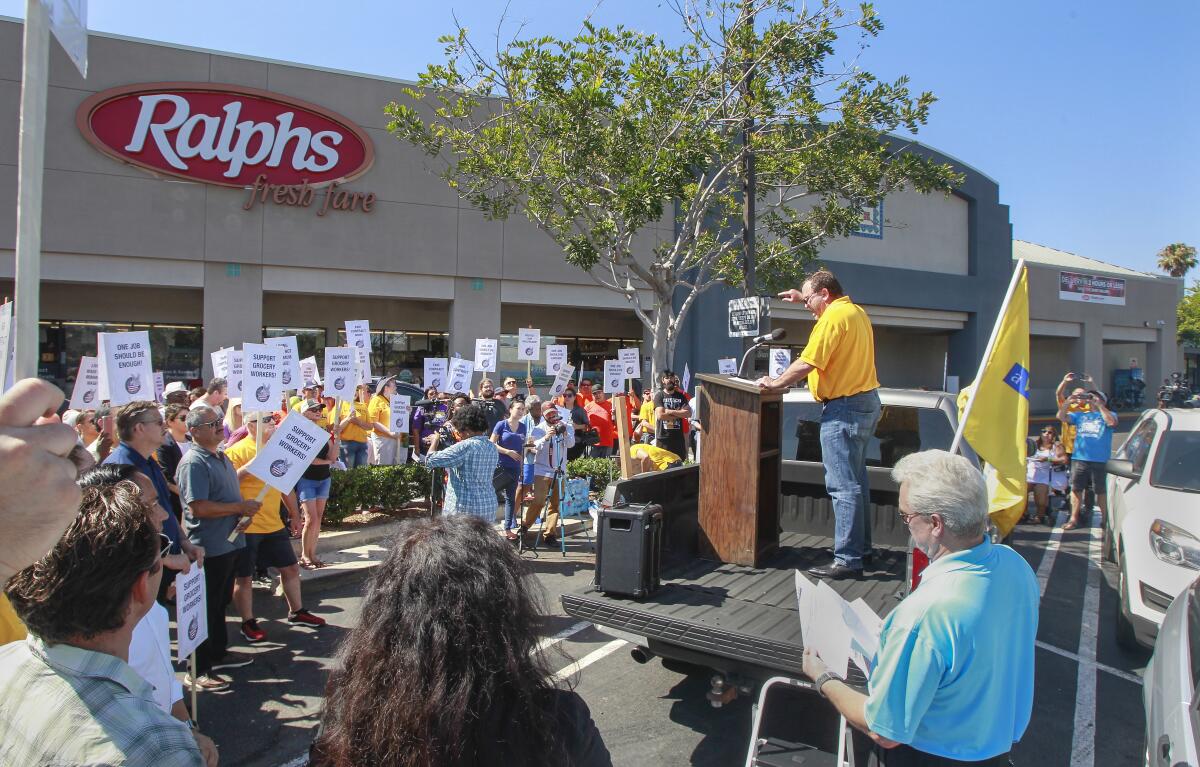Southern California grocery workers approve new contract

- Share via
Thousands of unionized grocery store workers have voted in favor of a new employment contract with major supermarket chains, preventing a strike that could have affected a large swath of California.
Roughly 47,000 employees of Ralphs, Vons, Pavilions and Albertsons stores in Southern and Central California were eligible to vote this week on the three-year contract. They voted “overwhelmingly” in favor of approval, the United Food and Commercial Workers union said Thursday. Specific numbers were not provided.
The union advised workers to vote yes on the pact after a lengthy negotiation process with the grocery stores that went into the early hours of Sunday morning. Union members had been working under a contract that expired March 3.
Todd Walters, the president of San Diego County’s UFCW Local 135, said the new contract was the best he’s seen in decades.
The contract includes hourly wage increases of $1.55 to $1.65 over the next three years, depending on the position. Workers also get more money from their employers for pensions and healthcare.
Ralphs, a division of Kroger Co., and Albertsons Cos., which owns Vons and Pavilions, said they were pleased. “We want to thank our employees for supporting this agreement and for the contributions they make to our company and service they provide our customers every day,” an Albertsons spokeswoman said in a statement Thursday.
The new pact follows months of negotiations between the UFCW union groups and the grocery companies. In June, workers voted to authorize union leaders to call a strike if contract talks with the supermarket chains didn’t yield a satisfactory agreement.
The last time Southern California had a grocery workers strike was in 2003-04, when nearly 60,000 workers walked off the job for more than four months. It was the largest and longest supermarket strike in U.S. history. In 2011, the union came close to striking, but after marathon negotiations, supermarkets and union leaders were able to reach a deal.
Walters cited the good economy and community support as reasons for the grocery stores’ willingness to negotiate on the deal.
“Unemployment is low, and people can get other jobs,” Walters said in an interview Monday. “But the community’s support was a big part of this. A lot of people showed up at our rallies. Grocery workers are your neighbors.”
A strike would have seriously disrupted the $45-billion grocery business in Southern California, with the Albertsons and Ralphs stores together representing nearly 40% of the market.
The strike 16 years ago caused financial hardship for the employees and cost the affected chains a combined $1.5 billion in lost sales. Nonunion grocers such as Trader Joe’s, Costco and Walmart benefited then, as shoppers unwilling to cross picket lines turned to those stores and, in many cases, formed new shopping habits that endured beyond the end of the strike.
Burt Flickinger, managing director of retail consulting firm Strategic Resource Group, called scoring a wage increase and a bump in pension contributions a victory for workers. Pensions across the nation are not growing at a good rate, he said, so extra money for their retirement fund was a lifeline.
The grocery chains’ investors shouldn’t be too worried about the concessions, he added. Raises and benefits help with worker productivity and retention — something he said is needed in this time of low unemployment.
More to Read
Inside the business of entertainment
The Wide Shot brings you news, analysis and insights on everything from streaming wars to production — and what it all means for the future.
You may occasionally receive promotional content from the Los Angeles Times.











